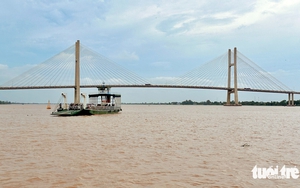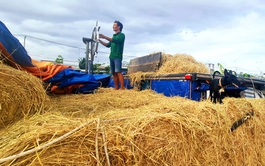
Floodwaters submerge rice fields in Thuong Phuoc Commune, in the upstream area of Dong Thap Province, southern Vietnam. Photo: Dang Tuyet / Tuoi Tre
From August to November, water from the upper Mekong River rises and spills over its banks, depositing nutrient-rich silt onto the fields and sweeping fish, crabs, and other aquatic life into the region’s waterways.
This year, in Dong Thap Province, linh fish (Siamese mud carp), field frogs, freshwater crabs, and other native species have become sought-after delicacies that provide locals with a good source of income.
The Dong Thap Hydro-Meteorological Station reported that water levels across the province this week were about 0.2 meters higher than the same period last year.
The highest reading at Hong Ngu station reached 2.32 meters, 10 centimeters higher year-on-year.
Bumper season for fish, frogs, and field crabs
On a day in August, Tuoi Tre (Youth) reporters recorded that in the fields of Thuong Phuoc Commune, Dong Thap Province, water had already flooded vast areas.
From early morning, people were out setting up fish traps and casting nets, while boats moved back and forth across the fields, creating a lively scene in the flooded landscape.

Local steer their boats across the flooded fields during the flood season in Thuong Phuoc Commune, Dong Thap Province, southern Vietnam. Photo: Dang Tuyet / Tuoi Tre
Pham Thi Be, a resident of Thuong Phuoc Commune, said the wild fish market runs twice a day, at dawn and in the early afternoon.
Locals collect large fish and other aquatic species from their traps and sell them to traders, who then bring them to market.
Smaller fish are often sold in bulk to make traditional fish sauce.
“Right now, at the start of the season, prices for freshwater fish like Bombay duck fish, gourami, climbing perch, and crab are still high, ranging from VND30,000 to VND80,000 per kilogram when sold directly to traders,” Be said.
“Siamese mud carps fetch VND40,000 to VND50,000 per kilogram, while fish for sauce making are cheaper.”

Fish collected from traps at dawn are sorted, with larger ones sold to traders and smaller ones fermented for fish sauce. Photo: Dang Tuyet / Tuoi Tre
Along the flood-control dikes, many anglers were catching field frogs, each netting two to three kilograms in a session.
Frog catching is both recreational and a source of fresh ingredients for family meals or for sale to earn extra income.
Nguyen Viet Em, also from Thuong Phuoc Commune, said hunting frogs is simple, requiring only a fishing rod, a hookless string, and golden apple snail or frog meat as bait.
Frogs often hide and hunt along dense canal banks and dikes.
“Frog fishing takes a bit of skill and quick hands,” Em revealed.
“When the frog bites, you have to jerk the string firmly and grab it quickly. If you’re slow, it will spit the bait and jump away.”
“I usually catch 2-3 kilograms per session, but fishing all day can sometimes yield up to 10 kilograms,” he added.
“Traders buy on-site for VND80,000 to VND120,000 per kilogram, depending on size.”

A bustling market during the flood season in Thuong Phuoc Commune, Dong Thap Province, southern Vietnam. Photo: Dang Tuyet / Tuoi Tre
Meanwhile Bui Van Du, another Thuong Phuoc resident, said he has been setting traps to catch field crabs, another high-value local delicacy, for many years.
With about 150 traps, he can harvest around five kilograms of crabs a day. The traps are mostly placed in flooded fields and irrigation canals.

Bui Van Du earns a living setting traps for freshwater crabs during the flood season in Thuong Phuoc Commune. Photo: Dang Tuyet / Tuoi Tre
“At the start of the flood season, the crab population isn’t abundant yet, but the selling price remains high, which provides extra income for those in the trade,” Du said.
“Aside from the traditional traps, crabs can also be caught using large nets, which double the yield,” he added.
“Currently, field crabs sell for about VND50,000 per kilogram, while crab claws fetch VND130,000 to VND300,000 per kilogram.”
(US$1 = VND26,272)




Max: 1500 characters
There are no comments yet. Be the first to comment.